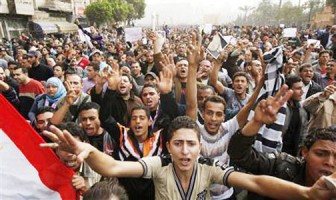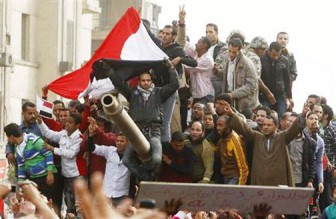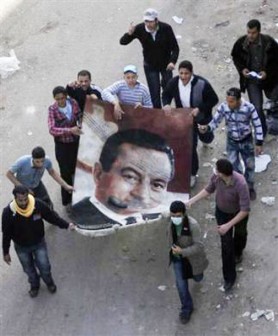CAIRO (Reuters) – Egypt’s street protesters pushed President Hosni Mubarak into naming a deputy who might in time succeed him, but thousands went on defying a curfew and urging the army to join them in forcing Mubarak from power immediately.

Police shot dead 17 people at Beni Suef, south of Cairo, as pressure mounted on Mubarak from allies in Washington and Europe to restrain his police and speed a democratic transition that would end his 30 years of one-man rule.
Thousands marched in Cairo by day, unmolested by troops who manned tanks on the streets. After dark, police there opened fire in at least one incident, looters roamed for booty, and the national tax office was set ablaze. Recalling eastern Europe in 1989, one analyst called it “the Arab world’s Berlin moment.”
In naming intelligence chief Omar Suleiman vice-president, many saw Mubarak edging toward an eventual, army-approved handover of power. The 82-year-old former general has long kept his 80 million people guessing over succession plans that had, until this week, seemed to focus on grooming his son Gamal, 47.

Gamal’s hopes now seem remote. The promotion of Suleiman, 74, a key player in ties with the United States and Israel, and the appointment of another military man, Ahmed Shafiq, as prime minister pleased some Egyptians worried about looming chaos.
According to various estimates about 100 people have been killed during the week, in the capital and other cities. Medical sources say at least 1,030 people were hurt in Cairo. Among the dead were three policemen killed in the capital.
“He is just like Mubarak, there is no change,” one protester said of Suleiman outside the Interior Ministry, where thousands were protesting. The last vice-president was Mubarak himself, before he succeeded the assassinated Anwar Sadat in 1981. Later, police opened fire on a crowd hundreds strong at the ministry. A Reuters reporter saw one protester fall wounded.
‘Berlin moment’
“This is the Arab world’s Berlin moment,” said Fawaz Gerges of the London School of Economics. “The authoritarian wall has fallen, and that’s regardless of whether Mubarak survives.
“The barrier of fear has been removed. It is really the beginning of the end of the status quo in the region.”
The prospect of even greater upheaval across the Middle East — regardless of whether it is the crowd or their rulers who get the upper hand — is prompting some investors to see risks for oil supplies that could in turn hamper global economic growth.
More immediately, Egypt’s vital tourist industry is taking a knock. In prosperous parts of Cairo, vigilantes guarded homes, shops and hotels from looters. Thieves at the Egyptian Museum damaged two mummies from the time of the pharaohs.

Of Suleiman’s appointment, analyst Gamal Abdel Gawad Soltan said: “This is the beginning of a process of power transfer.”
At the Center for Strategic and International Studies, Jon Alterman said: “I can’t see how this is not the beginning of the end of Mubarak’s presidency. It seems that his task now is to try and manage the transition past his leadership. I have a hard time believing that he will be the president in a year.”
Many saw Mubarak’s concessions as echoes of those made two weeks ago by Tunisia’s Zine al-Abidine Ben Ali. Just a day later, Ben Ali had fled his country, deserted by an army which preferred to back less hated figures in his government.
Tunisians’ Internet-fed uprising over economic hardship and political oppression has inspired growing masses of unemployed youth across the Arab world, leaving autocratic leaders worried.
With the French and British leaders, German Chancellor Angela Merkel said: “We call on President Mubarak to renounce any violence against unarmed civilians.” The European trio also called for “free and fair elections” — something that few doubt would end the grip of the establishment build up around Mubarak.
Islamists
Like other Arab leaders, the president portrays himself as a bulwark against the West’s Islamist enemies. But Egypt’s banned opposition movement the Muslim Brotherhood has been only one element in the week’s events. It lays claim to moderation.
“A new era of freedom and democracy is dawning in the Middle East,” Kamel El-Helbawy, a cleric from the Brotherhood said from exile in London. “Islamists would not be able to rule Egypt alone. We should and would cooperate.”
A Brotherhood lawyer in Egypt told Reuters that Mubarak’s hesitation to meet protesters’ demands had increased appetite for change. Abdel-Moneim Abdel-Maksoud said Mubarak should step down — but that an interim government was needed to preserve order for some months until free elections. On the Corniche promenade alongside the River Nile in Cairo, people stayed out after the curfew deadline, standing by tanks and chatting with soldiers who took no action to disperse them.
At one point, dozens of people approached a military cordon carrying a sign reading “Army and People Together.“ Soldiers pulled back and let the group through: “There is a curfew,” one lieutenant said. “But the army isn’t going to shoot anyone.”
The army’s moment
While the police are generally feared as an instrument of repression, the army is seen as a national institution.
Rosemary Hollis, at London’s City University, said the army had to decide whether it stood with Mubarak or the people: “It’s one of those moments where as with the fall of communism in Eastern Europe they can come down to individual lieutenants and soldiers to decide whether they fire on the crowd or not.”
In Alexandria, police used teargas and live ammunition against demonstrators earlier on Saturday. Protests continued in the port city after curfew, witnesses said.
So far, the protest movement seems to have no clear leader or organisation. Prominent activist Mohamed ElBaradei, a Nobel Peace Laureate for his work with the UN nuclear agency, returned to Egypt from Europe to join the protests. But many Egyptians feel he has not spent enough time in the country.
“Hosni Mubarak has not heard the people,” ElBaradei told Al Jazeera, renewing his call for the president to step down.
Banks will be shut today as “a precaution”, Central Bank Governor Hisham Ramez told Reuters. The stock market, whose benchmark index tumbled 16 per cent in two days, will also be closed today. The Egyptian pound fell to six-year lows.




